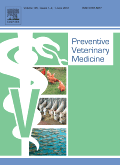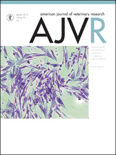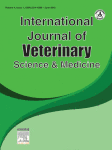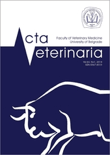
PREVENTIVE VETERINARY MEDICINE
Scope & Guideline
Empowering veterinarians with cutting-edge research for disease prevention.
Introduction
Aims and Scopes
- Epidemiological Studies:
Research that examines the distribution and determinants of health-related states or events in specific populations, often focusing on infectious diseases affecting livestock and companion animals. - Biosecurity Practices:
Studies aimed at assessing and improving biosecurity measures on farms to prevent disease outbreaks and ensure animal health. - Antimicrobial Resistance:
Research exploring the prevalence and factors associated with antimicrobial resistance in veterinary settings, including the implications for animal treatment and public health. - Decision Support Tools:
Development and evaluation of tools that assist veterinarians and farmers in making informed decisions regarding animal health management and disease prevention. - One Health Approach:
Interdisciplinary research that recognizes the interconnectedness of human, animal, and environmental health, often addressing zoonotic diseases. - Machine Learning and Data Analysis:
Utilization of advanced statistical and computational methods to analyze veterinary health data, aiming to predict disease outbreaks and improve management strategies. - Public Health Campaigns:
Assessment of initiatives designed to educate communities about animal health risks and promote preventive measures, such as vaccination and responsible pet ownership.
Trending and Emerging
- Integrated Disease Management Strategies:
There is a growing emphasis on holistic approaches that combine veterinary care, biosecurity, and management practices to enhance animal health and prevent disease. - Impact of Climate Change on Animal Health:
Research exploring how climate change affects animal health, disease distribution, and management practices is gaining traction, highlighting the need for adaptive strategies. - Use of Technology in Veterinary Medicine:
The incorporation of technology, such as telemedicine, wearable health monitoring devices, and data analytics, is increasingly prevalent in veterinary practices. - Community-Based Animal Health Approaches:
Emerging themes focus on involving local communities in animal health initiatives, promoting sustainable practices, and enhancing the capacity for disease prevention. - Zoonotic Disease Research:
Increased attention is being paid to zoonotic diseases, particularly in the context of global health security and the One Health paradigm, reflecting rising public health concerns.
Declining or Waning
- Traditional Animal Husbandry Practices:
Research centered on conventional farming methods is decreasing as the field shifts towards more innovative and sustainable practices, including precision agriculture and welfare-oriented systems. - Basic Virology and Pathology Studies:
There is a noticeable decrease in studies focusing solely on the basic aspects of virology and pathology without incorporating practical applications or interventions in veterinary medicine. - Generic Disease Surveillance Methods:
Generic approaches to disease surveillance are becoming less prominent as more specialized, data-driven, and context-specific surveillance strategies are being developed. - Historical Epidemiological Data Analysis:
Research relying heavily on historical data without new methodologies or technologies is waning in favor of real-time data analysis and predictive modeling. - Single-Species Focus Studies:
Research that examines diseases or health issues in isolation, without considering the broader ecological or epidemiological context, is declining as interdisciplinary approaches gain importance.
Similar Journals

AMERICAN JOURNAL OF VETERINARY RESEARCH
Empowering Animal Health with Innovative InsightsAmerican Journal of Veterinary Research, published by the American Veterinary Medical Association, serves as a cornerstone of the veterinary medical community, providing essential insights from 1945 to the present. With an ISSN of 0002-9645 and E-ISSN of 1943-5681, this esteemed journal focuses on a diverse range of topics within the veterinary field, contributing to the advancement of veterinary science through rigorous peer-reviewed research. Ranking in the Q2 category in Veterinary (miscellaneous) and Q3 in Medicine (miscellaneous) category as of 2023, it holds a respectable position in Scopus rankings, further emphasizing its impact in the field. While currently not an Open Access journal, its objective remains clear: to disseminate cutting-edge research that informs clinical practice and enhances animal health and welfare. The American Journal of Veterinary Research is invaluable for researchers, professionals, and students seeking to stay at the forefront of veterinary advancements and innovations.

International Journal of Veterinary Science and Medicine
Advancing veterinary knowledge for a healthier world.Welcome to the International Journal of Veterinary Science and Medicine, a leading platform for the dissemination of innovative research in the field of veterinary science. Published by TAYLOR & FRANCIS LTD, this esteemed journal has maintained an Open Access policy since 2013, ensuring widespread accessibility and engagement with cutting-edge veterinary studies. With an impressive impact factor and a Category Quartile ranking of Q1 in Veterinary (miscellaneous) as of 2023, it stands out as one of the top journals in its field, ranking #16 out of 194 in the Scopus Veterinary category, placing it in the 92nd percentile of academic publications. The journal encourages submissions of high-quality research and articles that contribute to advancements in veterinary medicine, ranging from clinical studies to public health implications. Located in the United Kingdom, the journal aims to foster collaboration and communication among veterinary professionals, researchers, and students, making it an indispensable resource for anyone involved in this vital field.

ACTA VETERINARIA-BEOGRAD
Exploring the frontiers of veterinary science.ACTA VETERINARIA-BEOGRAD is a distinguished academic journal dedicated to the field of veterinary science, focusing on a broad spectrum of topics pertinent to veterinary medicine and animal health. Published by SCIENDO, this journal has been an open-access resource since 2014, facilitating the dissemination of valuable research findings and innovations to a global audience. With an ISSN of 0567-8315 and an E-ISSN of 1820-7448, it plays a critical role in promoting accessible knowledge in veterinary practices while contributing to the advancement of the field. Located in Poland, this journal notably ranks in the Q3 quartile for veterinary studies, reflecting its ongoing commitment to quality and relevance. The journal welcomes contributions from a diverse range of veterinary disciplines, making it a vital platform for researchers, practitioners, and students alike who aspire to advance their understanding and impact within the veterinary community.

REVUE SCIENTIFIQUE ET TECHNIQUE-OFFICE INTERNATIONAL DES EPIZOOTIES
Advancing Veterinary Science for Global ImpactREVUE SCIENTIFIQUE ET TECHNIQUE-OFFICE INTERNATIONAL DES EPIZOOTIES is a prestigious journal published by the OFFICE INTERNATIONAL DES EPIZOOTIES based in France, known globally for its commitment to advancing knowledge in the fields of Animal Science and Zoology as well as Medicine. With its ISSN 0253-1933 and E-ISSN 1608-0637, this journal has been a vital resource for researchers and practitioners since its establishment in 1990. Currently ranked in the Q3 quartile across both the Animal Science and Medicine categories in 2023, it reflects a growing impact in the veterinary community, holding commendable ranks in the veterinary general and miscellaneous categories. Although it does not offer open access options, its comprehensive articles are crucial for informing best practices, public health policies, and advancing research in veterinary medicine. With an emphasis on innovative approaches and evidence-based studies, the journal serves as a significant platform for networking and collaboration among scholars, professionals, and students dedicated to improving animal health and welfare worldwide.

BMC Veterinary Research
Fostering innovation in veterinary research.BMC Veterinary Research, published by BMC in the United Kingdom, stands as a pivotal open-access platform dedicated to advancing the field of veterinary science since its inception in 2005. With an impressive impact factor that reflects its influential presence, this journal has achieved a remarkable ranking of #17 out of 194 in the Scopus Veterinary category, placing it in the 91st percentile among its peers. The journal serves as an essential resource for researchers, professionals, and students alike, fostering the dissemination of high-quality research and innovative practices within the veterinary and broader medical communities. With its commitment to open access, BMC Veterinary Research ensures that valuable insights are accessible to all, promoting collaboration and knowledge sharing that drive the advancement of veterinary sciences. As it continues to publish significant findings until 2024, it remains a key contributor to the contemporary discourse on animal health and welfare.

MAGYAR ALLATORVOSOK LAPJA
Advancing Veterinary Knowledge Since 1950MAGYAR ALLATORVOSOK LAPJA is a prominent journal dedicated to the field of veterinary science, published by MEZOGAZDA KIADO KFT in Hungary. With its inaugural issue dating back to 1950 and a continued presence into 2024, this journal serves as a vital platform for disseminating research and advancements in veterinary medicine and related areas. While the journal currently holds a Q4 classification in the Veterinary (miscellaneous) category, it provides a critical outlet for emerging findings and perspectives that may not be covered in more mainstream publications. Researchers, professionals, and students engaged in the veterinary field will benefit from its diverse range of articles, which are crucial for fostering knowledge and innovation in veterinary practice. Though it does not offer an open access option, the journal remains an essential resource for those looking to deepen their understanding of the veterinary landscape. The commitment to advancing the field is evident in every publication, making MAGYAR ALLATORVOSOK LAPJA a noteworthy contribution to veterinary literature.

Journal of Veterinary Science
Advancing Veterinary Knowledge, One Study at a Time.Journal of Veterinary Science, published by the Korean Society of Veterinary Science, is a distinguished peer-reviewed Open Access journal that has been contributing to the field of veterinary medicine since its inception in 2000. With an E-ISSN of 1976-555X, this journal not only provides critical insights for researchers globally but also maintains a strong presence within the academic community, evidenced by its impressive ranking in the Scopus database, where it stands at 44 out of 194 in the general veterinary category, placing it in the 77th percentile. The journal’s impact factor reflects its rigorous standards and the significance of the research it publishes, all while offering unrestricted access to its content since 2006, which promotes the free exchange of knowledge. Situated in the vibrant academic atmosphere of Seoul, South Korea, the Journal of Veterinary Science aims to advance veterinary research and practice, covering a broad spectrum of topics to inspire students, professionals, and established researchers alike to push the boundaries of veterinary science.

Thai Journal of Veterinary Medicine
Cultivating excellence in veterinary medicine across Thailand.Thai Journal of Veterinary Medicine, published by Chulalongkorn University, serves as a vital resource for researchers, practitioners, and students in the field of veterinary science. With an ISSN of 0125-6491, the journal has been providing a platform for the dissemination of original research and reviews since its inception, with a focus on advancing veterinary practice and animal health in Thailand and the broader Southeast Asian region. The journal is recognized in the Scopus database, currently ranked in the Q4 category for Veterinary (miscellaneous), reflecting its commitment to quality despite being in a highly competitive space. The scope of the journal encompasses a wide array of topics pertinent to veterinary medicine, ensuring accessibility to diverse veterinary disciplines. While the journal currently does not offer an open-access option, it remains dedicated to contributing valuable knowledge and insights to the veterinary community, supporting the improvement of animal welfare and public health initiatives in the region. As it continues to publish until 2024, the Thai Journal of Veterinary Medicine invites contributions that align with its objectives of fostering scholarly discourse and advancing veterinary research.

AUSTRAL JOURNAL OF VETERINARY SCIENCES
Pioneering Discoveries in Veterinary PracticesAUSTRAL JOURNAL OF VETERINARY SCIENCES is a prominent platform for innovative research in the field of veterinary science, published by UNIV AUSTRAL CHILE, FAC CIENCIAS VETERINARIAS. This journal, bearing the ISSN 0719-8000 and E-ISSN 0719-8132, serves as a vital resource for researchers, veterinarians, and students interested in advancing their knowledge in veterinary practices and animal health. With its influence reflected in its Q3 category ranking in the Veterinary (miscellaneous) field, and its Scopus rank of #95 out of 194, the journal highlights a robust commitment to disseminating valuable findings and insights. Between the years 2017 to 2024, it aims to provide open access to significant advancements and discussions in veterinary science, ensuring that vital research is accessible to a global audience. Located in Valdivia, Chile, the journal emphasizes its role in enhancing veterinary scholarship and fostering professional development within the community.

IRISH VETERINARY JOURNAL
Empowering animal health through innovative research.IRISH VETERINARY JOURNAL is a premier open-access publication in the field of veterinary science, established to disseminate high-quality research and innovations that advance the veterinary profession and animal health. Published by BMC since 2004, this journal not only ensures worldwide access to cutting-edge findings but also maintains an impressive ranking as Q1 in the Veterinary (miscellaneous) category according to the 2023 metrics, highlighting its significance and influence. With an impressive Scopus rank of #19/194 and a 90th percentile placement, it provides a robust platform for researchers, professionals, and students alike to engage with the latest studies, reviews, and case reports. The journal's coverage spans from its inception in 1973 to the present, catering to a diverse audience interested in various aspects of veterinary science, ensuring that it remains an essential resource for those passionate about the welfare of animals and the advancement of veterinary practices.